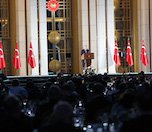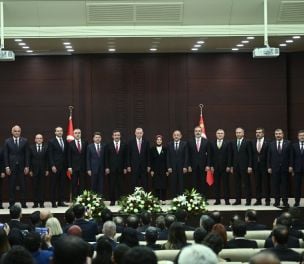Hakan Fidan (l) with his predecessor Mevlüt Çavuşoğlu during the transition ceremony today. (Photo: AA)
Click to read the article in Turkish
Hakan Fidan, who has been serving as Turkey's intelligence chief since 2010, has been appointed as the minister of foreign affairs by President Recep Tayyip Erdoğan in the new cabinet formed after the May 28 elections.
During his tenure, Fidan was at the center of several significant events, such as the "resolution process" for the Kurdish issue, the 2012 MİT crisis, where he was summoned as a "terror suspect," the 2015 MİT Trucks incident, and the July 15 coup attempt.
In defense of Fidan after the 2012 crisis, where he was summoned by prosecutors as a "terror suspect," then-PM Erdoğan had referred to him as "my secret keeper."
Fidan's career has spanned from being a non-commissioned officer to an academic, from bureaucratic positions to the directorship of the National Intelligence Agency (MİT), and now to the Ministry of Foreign Affairs.
Intelligence officer
Born in Ankara in 1968, Fidan graduated from the Land Forces Communications School and the Land Forces Language School. From the year he graduated in 1986 until 2001, he served as an non-commissioned intelligence officer within the Turkish Armed Forces (TSK).
In the 1990s, he was assigned for three years by the TSK to the Intelligence and Operations Directorate of the NATO Rapid Reaction Corps in Germany. During this assignment, he obtained a bachelor's degree in management and political science from the University of Maryland University College Europe.
In 2000, he was elected as a member of the general assembly of the Armed Forces Pension Fund (OYAK). After completing his 15 years of mandatory service, he resigned from the army. Upon his return to Turkey, he completed his master's degree in international relations in 1999 and his doctoral education in 2006 at Bilkent University.
From 2001 to 2003, he worked as a senior political and economic advisor at the Embassy of Australia in Ankara. From 2003 to 2007, he served as the president of the Turkish Cooperation and Coordination Agency (TİKA) under the Prime Ministry.
TİKA Presidency, which operates in collaboration with the Ministry of Foreign Affairs and intelligence units, played a significant role in Fidan's rapid advancement in the public bureaucracy.
During this period, he had close collaboration with then-PM Erdoğan, then-Foreign Minister Abdullah Gül, and Ahmet Davutoğlu, who was the foreign policy advisor to the prime minister.
On November 14, 2007, he was appointed as the deputy undersecretary of the Prime Ministry responsible for foreign policy and international security.
While holding this position, he was appointed as a member of the Board of Governors of the International Atomic Energy Agency in 2008. Later, he became a member of the board of trustees of the International Ahmet Yesevi University, from which he resigned in February 2011. He also served as a member of the Consultation Board of the United Nations Development Cooperation Platform and the Board of Directors of the Yunus Emre Foundation.
MİT chief
On April 15, 2009, Fidan was appointed as the Deputy Undersecretary of MİT. After the retirement of Undersecretary Emre Taner, he was appointed to this position on May 27, 2010. Thus, at the age of 42, Fidan became the youngest person to be appointed as the Director of MİT.
Fidan was also the second "civilian" figure to be brought in from outside to head the institution, alongside Sönmez Köksal, who served as the director of MİT from 1992 to 1998.
During his tenure as the director of MİT, Fidan played a crucial role in various important events and operations. One of the notable events was the "resolution process" initiated in 2012, aimed at resolving the long-standing Kurdish issue in Turkey.
Before and during that process, MİT officials engaged in negotiations with executives of the Kurdistan Workers' Party (PKK) in Oslo and the imprisoned leader of the group, Abdullah Öcalan. The Oslo talks, which took place in 2010, were revealed to the public when voice recordings from the talks were leaked to the press in September 2011.
The MİT crisis
While heated debates were taking place in the public sphere following the disclosure of the Oslo talks, the MİT Crisis occurred.
On February 7, 2012, Chief Prosecutor Sadrettin Sarıkaya summoned Fidan, along with Emre Taner, Afet Güneş, and two MİT members, to testify as suspects in an investigation concerning the Kurdistan Communities Union (KCK), the political umbrella group of the PKK.
Erdoğan's response to this was to enact Law No. 6278, which required permission from the Prime Ministry to initiate criminal investigations against MİT members and certain public officials. The parliament had amended the National Intelligence Organization Law in a meeting that lasted nine hours. The MİT members did not testify.
Later, the government claimed that the investigation in which Fidan was summoned was a plot orchestrated by the Fetullah Gulen group, which was later held responsible for the 2016 coup attempt. The former prosecutor who had summoned Fidan, Sadrettin Sarıkaya, was sentenced to 11 years and 3 months in prison in 2021 for "being a member of the Fetullahist Terrorist Organization."
During that time, Erdoğan had defended Fidan, saying, "I am the one who sent him to İmrali [referring to PKK leader Öcalan], and I am the one who sent him to Oslo... He is my secret keeper. The secret keeper of the Republic of Turkey... The secret keeper of Turkey's future..."
"False flag" recordings
In 2014, during the discussions about a military operation following the threat to the Suleyman Shah Tomb, which belongs to Turkey and is located in Syria, a leaked voice recording was published, claiming to include then-Foreign Minister Ahmet Davutoğlu, Undersecretary of the Ministry of Foreign Affairs Feridun Sinirlioğlu, Deputy Chief of the General Staff Lieutenant General Yaşar Güler, and MİT Undersecretary Hakan Fidan.
The alleged conversation attributed to Davutoğlu stated that if Turkey made bold decisions in the past, such a process would not have occurred, while the voice attributed to Güler emphasized the need for ammunition and weapons at that time. It was noteworthy that during the discussions, the voice attributed to Fidan stated, "We have sent nearly 2,000 trucks there."
As the search for a justification for intervention continued in the recording, the voice attributed to Fidan said, "Now listen, commander, now if we need a justification, I can send four people to the other side [of the border], and I can have eight missiles fired into empty areas. That's not a problem. A justification can be created."
The Ankara Chief Public Prosecutor's Office initiated an investigation into the leakage of the voice recordings, and the Radio and Television Supreme Council (RTÜK) imposed a temporary broadcasting ban on the recordings.
After the leakage of the voice recording on YouTube, PM Erdoğan blamed the Gülen group, which he referred to as the "parallel state structure," due to their infiltration in state agencies. He described the incident as "betrayal" and an immoral act aimed at Turkey's national security.
Following the leak of the voice recordings, an investigation was initiated by the Ankara Chief Public Prosecutor's Office, and the Radio and Television Supreme Council (RTÜK) imposed a temporary broadcasting ban on the recordings.
The "MİT trucks" incident
On January 1, 2014, and January 19, 2014, trucks heading to Syria were stopped in Kırıkhan, Hatay, and Ceyhan, Adana, in southern Turkey, respectively, through a joint operation by the gendarmerie and the police, based on a prosecutor's order.
Initially, officials stated that the materials in the trucks were state secrets.
Erdoğan once again blamed the Gülen group, saying, "A prosecutor cannot engage in such an intervention without my permission or the knowledge of the Ministry of Justice. They cannot inspect what the National Intelligence Organization brings and takes."
Following the incident, investigations were launched against prosecutors, military personnel, and police officers involved in the stopping of the trucks. During the process, some prosecutors, military personnel, and police officers had their positions changed, some were suspended, and some were arrested.
On May 29, 2015, Cumhuriyet newspaper published a headline saying, "Here are the weapons Erdoğan denied." The article shared photos and information from the operation where three trucks were stopped on January 19, 2014. It alleged that these trucks were carrying weapons to be supplied to groups fighting against the Syrian government. The images were claimed to have been obtained from the investigation file. Shortly after, a broadcasting ban was imposed on the images.
President Erdoğan reacted strongly to the article, which he described as a "spying activity," and stated that the newspaper would pay a heavy price for publishing it.
Erdoğan mentioned that a lawsuit was filed regarding the news and claimed that it was aimed at "supporting the Turkmen of Bayırbucak," accusing the "parallel structure" in connection with the article.
Parliamentary candidacy
Before the 2015 parliamentary elections, Fidan resigned from his position, in order to run as a candidate for the AKP. However, President Erdoğan explicitly expressed his opposition to his candidacy.
On March 9, Fidan announced in a written statement that he had withdrawn his candidacy to the AKP due to "perceived necessity." On March 10, he was reappointed as the Undersecretary of MİT.
Coup attempt
During the attempted coup on July 15, 2016, Fidan's name was one of the central figures in the discussions.
At 2:30 p.m., Major O.K., who was serving at the Land Aviation Command, went to the headquarters of MİT and reported that a plan was being made to take Fidan from the Land Aviation Command with a helicopter on the evening of July 15. O.K. mentioned that this could be a coup attempt.
Upon receiving this information, Fidan went to the headquarters and informed Chief of General Staff Hulusi Akar about the situation, hours before the beginning of the coup attempt. However, it was claimed that the discussions with Akar did not involve the mention of a coup, but only focused on an operation targeting Hakan Fidan.
Later, Erdoğan had stated that he had learned about the coup attempt not from MİT or other intelligence agencies but from his "brother-in-law." (RT/VK)






